New electric cars 2019
Our guide to the most exciting and important new electric cars of 2019
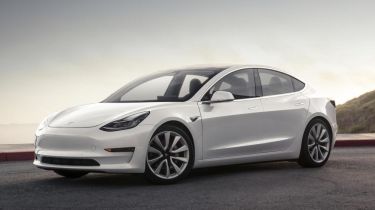
Prospective electric-car buyers have plenty to look forward to in 2019. With pioneering marques like Tesla, Nissan and Jaguar already selling electric cars across a number of market segments, 2019 is set to be the year when other major manufacturers look to get in on the action.
With the likes of the Volkswagen Group, Honda, Kia, Mercedes and Volvo all focusing their efforts on electrified ranges and standalone electric vehicles, 2019 will see more electric cars go on sale than ever before. Buyers will have the choice of everything from frugal hatchbacks to luxury SUVs, with some sportier models in the offing, alongside practical additions like the still-to-be-seen Tesla Pickup.
Even established luxury brands steeped in decades of internal-combustion engine design look set to join the electric revolution in inimitable style: Aston Martin, Porsche and Bentley are all looking towards their electric futures with a new model each.
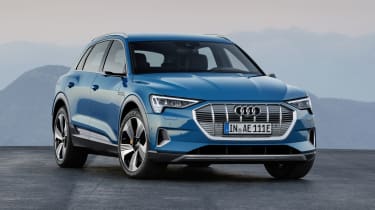
Audi e-tron
Like Mercedes with the EQC, Audi is taking a traditionally styled approach to fully electric vehicles. The Audi e-tron looks like many of the brand’s existing SUVs, such as the Q5, but underneath its unassuming exterior there's a sophisticated dual-motor electric setup producing the equivalent of up to 402bhp.
Loyal Audi customers will be pleased to find the brand’s affinity with four-wheel drive is alive and well, too; the e-tron features what Audi calls ‘e-quattro’, with one electric motor fitted to each axle. An effective range of 250 miles is claimed, while Audi states that the car’s battery can be charged from zero to 80% capacity in less than 30 minutes from a 150kW fast charger.
Sitting between the Audi Q5 and Q7 in size, the e-tron looks set to offer a typical luxury SUV experience, albeit under electric power. It shouldn’t be a slouch either – 0-62mph takes less than six seconds, while top speed is quoted as 124mph.
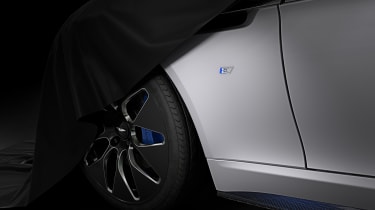
Aston Martin Rapide E
The Aston Martin Rapide E is the traditional British manufacturer’s first foray into the world of electric cars – and it looks set to make waves in considerable style. It's based on the Aston Martin Rapide S, but replaces that car’s 6.0-litre V12 petrol engine with electric motors and a 64kWh battery. With the equivalent of 602bhp sent to its rear wheels, the Rapide E will go from 0-62mph in less than four seconds, with 50-70mph completed in just 1.5 seconds; Aston Martin claims a targeted top speed of 155mph, too.
Aston Martin plans to make just 155 examples of the Rapide E, which will be built at the company’s new factory in St Athan, South Wales. An official price has yet to be announced, but we reckon this limited-run rival to the forthcoming Porsche Taycan will cost in the region of £250,000. Aston Martin is currently accepting expressions of interest from buyers; first deliveries are expected to take place in autumn 2019.
Bentley EV
Another historic British brand set to try its hand at electrification is Bentley, with its as-yet unnamed four-door electric car tipped for release in 2019. As part of the VW Group, Bentley has access to the sophisticated electrified underpinnings used in the forthcoming Porsche Taycan; it’s likely that Bentley’s effort will compete directly with that car as well as using some of the same technology.
We don't yet know how the first electric Bentley might look, and technical details are still uncertain. Speaking to our sister title Auto Express, former Bentley CEO Wolfgang Dürheimer suggested that using the ‘J1’ platform unlocks a range of up to 310 miles, with a power figure of around 600bhp.
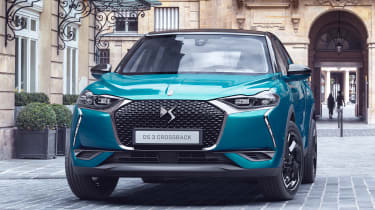
DS 3 Crossback E-Tense
Set to arrive late in 2019, the DS 3 Crossback E-Tense is the electric version of the new DS 3 Crossback, a small SUV that’s aimed at the likes of the Audi Q2 and BMW X2. While the standard model will be offered with a range of petrol and diesel engines, the E-Tense gets an electric motor with the equivalent of 136bhp and a 50kWh battery.
DS claims it'll boast a 186-mile range and a 0-62mph time of 8.7 seconds. Inside and out, the new car aims to set itself apart from its more austere rivals with a chic and distinctly French design.
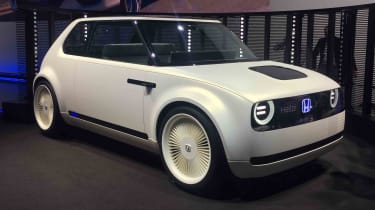
Honda Urban EV
Another first for this list, the Honda Urban EV will be the Japanese manufacturer’s first purely electric production car when it arrives. Originally unveiled in concept form (pictured) at the 2017 Frankfurt Motor Show, its retro-futuristic design went down a storm; now, Honda plans to sell the model with few changes. Sales are set to start in early 2019, with the first cars arriving in Europe later in the year.
Details of the Honda Urban EV’s powertrain have yet to be announced, but Honda has stated that the car uses a completely new platform, with a lightweight high-density battery. The concept’s minimalist interior should make it to production, too, but we’d be surprised if Honda didn’t tone down its mammoth floating infotainment screen. Measuring in 100mm shorter than the current Honda Jazz and taking inspiration from the original Honda Civic of the 1970s, the Urban EV promises to be a stylish and manoeuvrable companion around town.
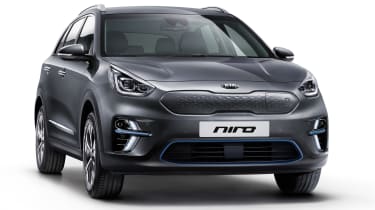
Kia e-Niro
The Kia Niro is a popular SUV that’s currently available in hybrid and plug-in hybrid variants, but the South Korean manufacturer is set to add a third model to the range in 2019 – the all-electric Kia e-Niro. With a choice of either 39.2 or 64kWh batteries, the e-Niro offers a claimed range of either 193 or 301 miles, with the more powerful battery offering up to 382 miles of city driving from a single charge.
The less powerful model will feature a 100kW electric motor with the equivalent of 134bhp, boasting a 0-60mph time of 9.8 seconds. The 64kWh version, meanwhile, gets a 150kW motor (201bhp) with a 0-60mph time of 7.8 seconds. Both models are front-wheel drive like other Niros. while styling hasn’t changed drastically; a fared-in grille and turquoise-coloured highlights set the new model apart from its internal-combustion-engined cousins.
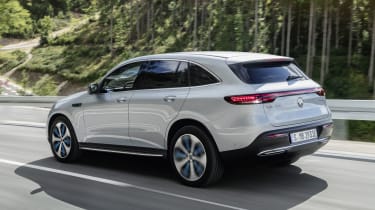
Mercedes EQC
Mercedes’ contribution to the luxurious electric SUV trend and cars like the Jaguar I-Pace and Audi e-tron is this, the EQC. When it goes on sale in early 2019, it’ll be the first car to carry the ‘EQ’ name, which is set to feature on all future electric Mercedes models. The EQC is a mid-sized SUV powered by two electric motors, one for each axle, which together produce 300kW (equivalent to around 400bhp). The result is a 0-62mph time of 5.1 seconds and a top speed of 112mph.
A 280-mile range is claimed for the EQC, while Mercedes also suggests that the car’s 80kWh battery can be charged from 10% to 80% in around 40 minutes given access to a 110kW charger. Much like its Audi e-tron rival, the Mercedes EQC aims to provide electric motoring in a fairly traditional luxury SUV package, shying away from over-the-top styling.
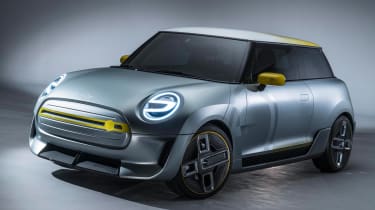
MINI EV
Although we’ve only seen a concept and some teaser shots so far, an all-electric MINI hatchback has been confirmed for release in 2019. The car has been spotted testing, albeit under a comprehensive disguise.
While official details of the car’s powertrain and performance are yet to be revealed, it’s likely that the MINI EV will share much of its powertrain with the current BMW i3 – this should equate to a range of around 200 miles and a 0-62mph time of less than eight seconds. MINI will be keen for it to offer the brand's trademark fun driving experience, either; a sporty John Cooper Works model was alluded to by head of MINI design Oliver Heilmer in conversation with our sister title Auto Express.
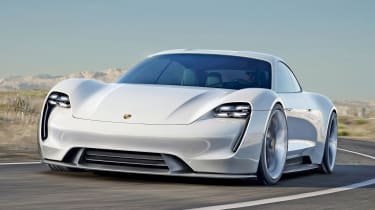
Porsche Taycan
Previously known as the Porsche Mission E, the Taycan is the German sports-car manufacturer’s answer to the Tesla Model S – a sporty four-door coupe with an emphasis on performance as well as long driving range. Exact details of the Taycan’s powertrain and performance in production form are yet to be announced, but as the Mission E concept, the car featured two electric motors producing enough power for a 0-62mph time of 3.5 seconds, 0-124mph in 12 seconds and a top speed of 155mph. A Taycan with this kind of performance is expected to sit at the top of the range when it arrives in 2019.
As a model, the Taycan will sit just below the Porsche Panamera in the brand's range, with a starting price of around £60,000-70,000. This should put less powerful versions squarely in competition with the Tesla Model S and Jaguar I-Pace.

Tesla Model 3
Although its development and production have been plagued by a number of issues, the Tesla Model 3 should finally arrive on sale in the UK in 2019. Smaller and more affordable than the US company’s Model S and Model X, the Model 3 is set to bring electric power to the compact executive saloon market.
Tesla has suggested that the Model 3 will boast a 210-mile range in standard form, with a 0-62mph time of 5.1 seconds and a top speed of 130mph. A more expensive longer-range version should give a range of 310 miles, with a swifter 0-62mph time of 4.5 seconds; this car has already been delivered to US customers. The recently released Performance model offers a blistering 3.5-second 0-62mph time and is set apart by its large 20-inch alloys.
Tesla is at the forefront of charging technology and has claimed it’s possible to charge the Model 3 to a 130-mile range in just 30 minutes using one of the company’s Superchargers. A domestic socket charge will give around 30 miles of range for every hour of charging.
Tesla Pickup
A wild-card entry on this list, the Tesla Pickup is due to arrive in 2019 and should be in a class of its own. Four-wheel drive courtesy of dual electric motors, a large battery pack offering a range of 400-500 miles and performance not too far removed from the rest of the American brand’s vehicles are all suggested, although we've yet to learn of any official details.
Styling is another aspect that’s still up in the air, but the pickup is expected to integrate trademark Tesla styling cues into a rugged dual-cab pickup design. We expect that most of the Pickup’s technology will be shared with the current Model X SUV, so prices should be pretty robust – especially when compared to its more conventional diesel-powered rivals like the Mercedes X-Class.
Volvo V40
The forthcoming new Volvo V40 is aimed straight at the Volkswagen Golf, and as such will be offered both in petrol-electric hybrid and all-electric forms. Due to arrive in 2019 and built on the same platform as the stylish XC40, the next V40 will share much of that SUV's sharp styling, smooth ride and upmarket feel. We’ve yet to see the car, but features like Volvo’s ‘Thor’s Hammer’ lights and bold, broad shoulders are almost guaranteed to feature here.
The new V40's platform has been designed from the outset to allow the car to be fitted with an electric drivetrain; while exact details are still to be confirmed, it’s expected that the car will be offered with various sizes of battery, with larger batteries giving a longer range.